Upholding the Tata legacy of creating social impact beyond business, Tata Motors has made a remarkable difference across the domains of Education, Employability, Health and Environment through its extensive CSR initiatives. Their efforts have touched more than 60 lakh lives over the past 10 years, with a significant percentage of beneficiaries belonging to the marginalised communities.
In this exclusive interview with TheCSRUniverse, Mr. Vinod Kulkarni, CSR Head at Tata Motors, goes into the details of their work in education and employability, particularly their collaboration with Jawahar Navodaya Vidyalayas (JNV). The initiative, which commenced in 2013-14, has evolved into the ENABLE project, reaching 577 JNVs and benefiting over 16,000 students. He sheds light on the specific roles of each organization, highlighting Tata Motors' establishment of 'Automotive Skill Labs' at 25 JNVs and JNVs' responsibilities in creating the academic framework for vocational education in alignment with the National Education Policy 2020. We also get to know about other ongoing skilling projects like the LEAP program which is breaking gender barriers in the automotive industry.
The discussion also outlines other key initiatives, including those in the domains of health and environment, such as addressing malnutrition, empowering leprosy patients, digital empowerment in education, skilling unemployed youth, and restoring forest cover. Their parameters for resource allocation and decision-making factors for project selection are elucidated.
Drawing upon is vast experience, Mr. Kulkarni shares insights and recommendations for enhancing the effectiveness of CSR initiatives and gives us a picture of Tata Motors' roadmap for future CSR endeavors, emphasizing the company's commitment to fostering inclusive growth and contributing to a sustainable India through meticulous planning and resource utilization.
Read the full interview for rich insights on the meticulous approach and strategies of Tata Motors crafted to create social impact across domains:
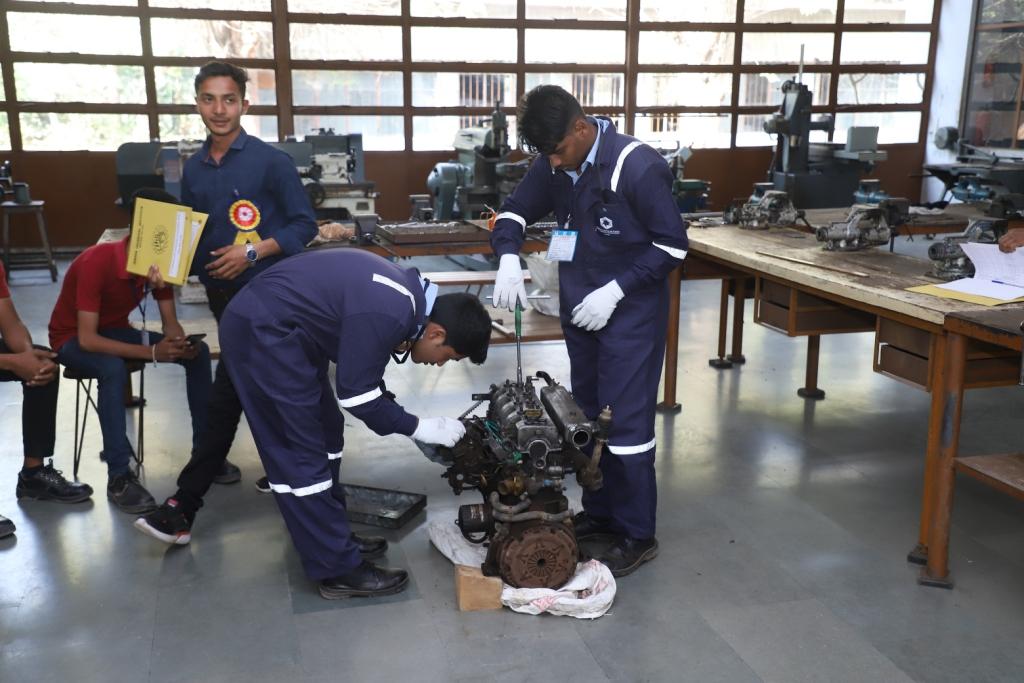 Q. Tata Motors recently announced their collaboration with Jawahar Novodaya Vidyalayas (JNV) for vocational education. What are the primary objectives of this collaboration and how does it align with the broader CSR vision of your company?
Q. Tata Motors recently announced their collaboration with Jawahar Novodaya Vidyalayas (JNV) for vocational education. What are the primary objectives of this collaboration and how does it align with the broader CSR vision of your company?
A. Our partnership with Navodaya Vidyalaya Samiti (NVS), the governing body of Jawahar Navodaya Vidyalayas (JNVs), began in 2013-14. At that time, we introduced JEE and NEET coaching for XI and XII standard students in one JNV, which had a total of 40 students. Over the years, this initiative grew and transformed into ENABLE, an online teaching project. Currently, ENABLE covers a total of 577 JNVs, benefiting more than 16,000 students. Furthermore, with the implementation of the New Education Policy, our engagement expanded to include a Skilling initiative as well.
One of the main goals of our collaboration with JNV is to impart automotive skills and knowledge to secondary and senior secondary students through vocational education. This initiative will help students gain practical skills in the automotive sector and prepare them for employment opportunities after completing their education. Our partnership with JNV is in line with our broader CSR vision of Tata Motors. We believe in enhancing the lives of the youth by providing them with skills that are in demand in the automotive industry. This initiative is a manifestation of our commitment to support the ‘Skill India Mission’ and foster talent development. We are also promoting holistic education by offering vocational education in collaboration with JNV. We are reaching out to students from underprivileged communities and giving them a chance to explore their potential in the automotive field. This is consistent with our CSR vision of empowering youth and bridging the skills gap in the automotive industry. It demonstrates our commitment to building a future-ready workforce and making a positive social impact through skill development and education.
Q. What are the specific roles that each organisation (Tata Motors and JNV) has in this joint project?
A. The joint project between Tata Motors and Jawahar Navodaya Vidyalayas (JNV) involves a clear division of roles and responsibilities for each organization.
Tata Motors has set-up the ‘Automotive Skill Lab’ infrastructure at 25 JNV schools, providing equipment and facilities for hands-on training. Tata Motors trains the instructors how to teach vocational subjects well. Tata Motors facilitates an hands on training through exposure visits to these students in the nearby dealers, Tata Autoised Service Stations and operating locations. We also organised Train the Trainers programme to upskills the trainers to the new technologies and developments. Expert lectures are organised on regular basis . Tata Motors also gives students the opportunity to pursue a fully-funded Diploma in Mechatronics, with on-the-job training and stipends at Tata Motors’ factory.
Whereas, Jawahar Navodaya Vidyalayas (JNV) are responsible for creating the academic framework in which vocational education operates. They make sure that the curriculum follows the guidelines set by the Central Board of Secondary Education (CBSE) and the ‘National Education Policy 2020’. JNVs have hired trainers to impartthe vocational courses within their schools, encouraging student participation, handling day-to-day operations, and providing necessary academic support. Moreover, JNVs play a vital role in delivering holistic education by integrating academic and vocational streams as per the NEP 2020, fostering an environment in which students can excel academically while acquiring valuable practical skills.
Both the agencies collaboratively participates in regular reviews. This collaborative effort leverages the strengths of both Tata Motors and JNV, offering students a well-rounded education that enhances their employability and skill development.
Q. Could you tell us a little more about the curriculum of the courses for secondary and senior secondary students and how do they align with the 'National Education Policy 2020'?
A. The courses are called Automotive Courses (404 & 804) and they aim to provide students with knowledge, hands-on automotive skills and industrial exposure in the automobile domain. The courses are offered to students in 9th to 12th grade and the curriculum and lab setup have been designed as per the CBSE guidelines and with inputs from the Tata Motors. The courses cover topics such as automotive fundamentals, engine systems, transmission systems, electrical systems, chassis systems, vehicle maintenance, safety and environment.
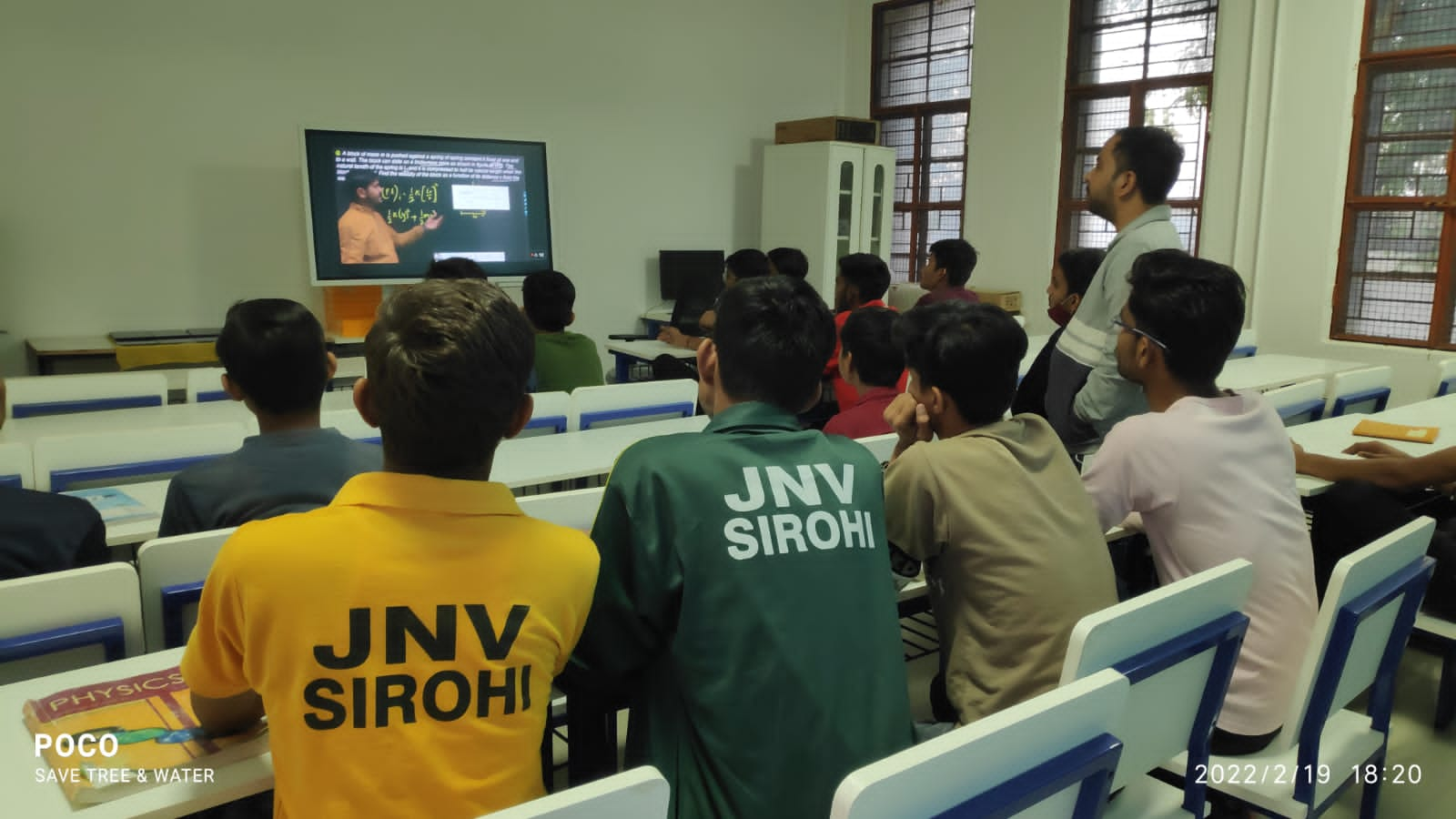 The courses align with the ‘National Education Policy 2020’ in several ways:
The courses align with the ‘National Education Policy 2020’ in several ways:
- Offer students the opportunity to learn vocational subjects in the automotive domain along with their academic subjects, thus providing them with a holistic education.
- Offers students with multiple exit options after completing their schooling. Students can opt for a Diploma in Mechatronics that will be fully funded by Tata Motors, or they can seek employment opportunities in the automotive industry, or they can pursue higher education in engineering or other fields.
- Offer students flexibility and choice of subjects to study, as they can choose to take up automotive courses as an elective or a core subject, depending on their interest and aptitude.
- Also expose students to local and global knowledge in the automotive domain, as they learn about the latest technologies, innovations, trends, standards, regulations, etc., in the automobile industry. They also get industrial exposure through on-the-job training at Tata Motors’ manufacturing facility.
Q. The project with JNV also talks about the progression of students from vocational courses to professional education. Will Tata Motors also be helping the students’ career growth beyond school?
A. Tata Motors is committed to enriching the lives of the youth by empowering them with employable skills and bridging the skills gap in the automotive industry. The company not only helps students with vocational education, but also with professional education and career development.
Tata Motors offers students the opportunity to pursue a fully-funded Diploma in Mechatronics/ automobiles, coupled with on-the-job training at Tata Motors’ manufacturing facility, ensuring practical experience and stipends for students. The students who successfully complete their Diploma can pursue a four-year B. Tech degree in engineering from any of the reputed engineering colleges in India, with financial assistance from Tata Motors. Then, students who finish their B. Tech degree can either seek employment opportunities within Tata Motors or any other automotive industry. Tata Motors will also provide career guidance and mentoring to the students to help them achieve their professional goals. This is a unique programme that bridges the gap between vocational and professional education, and prepares students for a career in the automotive sector.
Q. Apart from the collaboration with JNVs, what are the other ongoing skilling and employability initiatives by Tata Motors? Could you highlight one such project and its impact so far?
A. Tata Motors is one of the leading automobile manufacturers in India that has several ongoing skilling and employability initiatives for the youth.
One such initiative that I would like to highlight is our LEAP programme, part of the Kaushalya initiative by Tata Motors, as it is a novel initiative that empowers the unemployed and drop –out youth from underprivileged communities to pursue a career in the automotive sector. LEAP has also been instrumental in breaking the gender barriers in this male-dominated industry by encouraging more girls to enroll in the automotive service technician course. The LEAP programme was initiated in the year 2013-14 with in two institutes and has scaled up to 60 institutes by Oct 2019 with footprint across 16 states. The entire course is run in Public-Private-Partnership Model (Industrial Training Institutes+ Dealer & TASSs+ Tata Motors); while Tata Motors is the knowledge partner and provides the content for the training, the training is conducted by Industrial Training Institutes. This one-year course has two components- 3 months theory in the Institutes and 9 months of On-Job-Training (OJT) with a stipend, at the Dealers or Tata Authorized Service Station with concurrent theory classes once a week in the respective ITIs. Post training, the students are assessed by Automotive Skills Development Council and more than 85% find placement within or outside the Tata Motors ecosystem, with average salary ranging between Rs. 15000 to 18000, thereby creating a positive impact on their lives and the economy.
Q. Tata Motors also emphasizes Health, Education, and Environment in its CSR initiatives. What are the parameters that guide the resource allocation among these focus areas?
A. Tata Motors is committed to sustainable development, where business goes hand in hand with societal wellbeing and environmental consciousness. The company’s CSR strategy attends to the societal needs starting from pre-natal care to education, and serves across the spectrum – helping with high-school level courses to professional ones, leading to employability and employment. The parameters that guide the resource allocation among these focus areas are:
- The alignment of the CSR initiatives with the company’s vision, mission, and values
- The identification of the most pressing developmental challenges and the most vulnerable communities in the areas of operation
- The assessment of the impact potential, scalability, sustainability, and replicability of the CSR initiatives
- The availability of financial and human resources, as well as partnerships with government bodies, local authorities, implementation partners, and beneficiaries
- The monitoring and evaluation of the CSR initiatives using key performance indicators, feedback mechanisms, and social audits
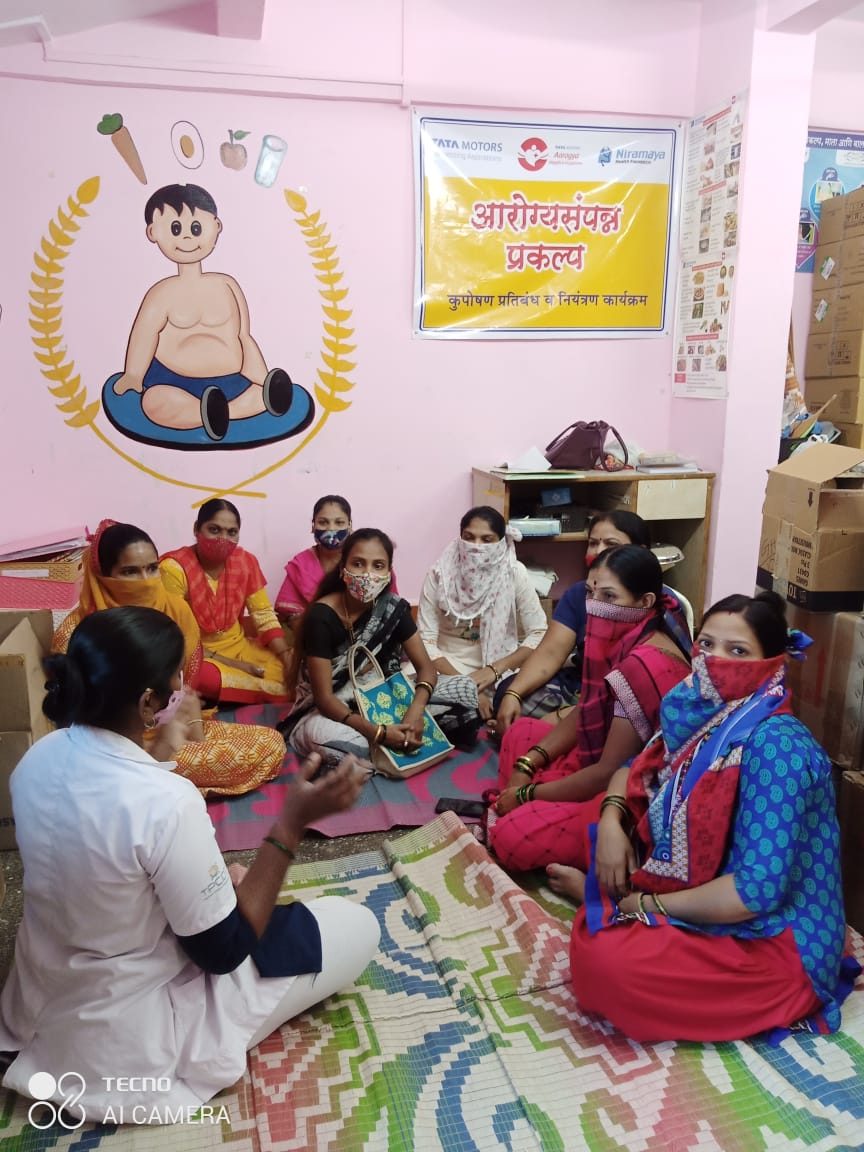 Q. Could you tell us about some of the key projects in each of the focus areas mentioned above?
Q. Could you tell us about some of the key projects in each of the focus areas mentioned above?
A. Here's a quick glance into the company’s select marquee projects in the areas of Health, Education, Employability, and Environment, that have made a significant impact in terms of convergence, scale and reach, over the last ten years:
1. Addressing Malnutrition Through Community-based Interventions: Tata Motors has made significant strides in addressing the issue of malnutrition among children. By shifting its focus from institutional-based clinical approaches to community-based health interventions, the company has been able to create a sustainable impact. Despite having high levels of severely acute malnourished and moderately acute malnourished children in some of the targeted states, the company has successfully moved more than 91% of malnourished children to healthy zones in the past decade.
2. Empowering Leprosy Patients with Early Detection and Care: Tata Motors has been actively involved in raising awareness about leprosy and providing early detection and care to affected individuals. Through annual door-to-door awareness campaigns in hard-to-reach villages, the company has screened thousands of households, identified and treated over 4,000 leprosy patients. The company's community-based Leprosy programme in Jharkhand, a state with a high incidence of the disease, is the first of its kind initiative in the country to eradicate the disease.
3. Bridging the Educational Gap through Digital Empowerment: Tata Motors' flagship remote learning programme, ENABLE, has helped talented students from over 557Jawahar Navodya Vidyalayas access resources and guidance for admission to the top engineering and medical institutions. Over the past decade, this programme has benefitted nearly 20,000 aspirants from underprivileged backgrounds, many of whom have secured admissions in prestigious institutions such as in IITs, AIIMS and government-run engineering and Medical colleges. Additionally, support classes are being conducted for students in grades IX and X in state-run government schools, utilising both digital and in-person modes. This approach has proven to be effective in improving the pass rates and academic performance. Notably, this model has been successfully implemented in about 200 schools under the Thane and Brihanmumbai Municipal Corporation (BMC) in Maharashtra.
4. Skilling Unemployed Youth for a Brighter Future: The LEAP programme, part of the Kaushalya initiative by Tata Motors, focuses on skilling unemployed youth, especially in Automotive courses and facilitating their entry into the workforce. This programme has also enabled young women to overcome stereotype barriers and attain financial independence. Over the past decade, this skilling initiative has grown from 2 to 60 institutes. About 85% of the trainees have secured placement with an average salary ranging between Rs. 15000 to 18000, thereby creating a positive impact on their lives and the economy.
5. Restoring and Expanding Rural and Urban Forest Cover: With the objective of creating sustainable livelihoods for the farmers in rural areas through Agro-Forestry plantation and transforming unused land into cultivable areas by prioritising government convergence, the company has successfully planted nearly one million trees, ensuring the survival of over 90% of them. In FY24, an additional one million trees are planned to be planted. In the Urban sector, the company’s CSR hascollaborated with the Forest Department (GOI) and TERRE Policy Center, a significant expanse of 16.5 hectares of forest land in Warje (urban Pune) has been reforested. This initiative has led to the creation of micro-habitats that support a diverse range of flora and fauna. Over the past decade, the project has expanded to cover an area of 200 hectares, contributing to the restoration of urban forest cover and the preservation of biodiversity.
6. Water Security:This year, the company has created100 Amrit Sarovars with a capacity of storing nearly 186 Crore Ltrs of water, leading to enhanced water availability in 81sites in Palghar district and 25 sites in Pune &Satara district.
Q. Given the broad areas of focus for your CSR initiatives, you must be coming across a lot of issues and projects in each area. What are the factors that are taken into account while deciding on which projects to undertake?
A. Tata Motors is a responsible corporate citizen that strives to make a positive impact on the society and the environment through its CSR initiatives. The company has a well-defined CSR policy and framework that guides its decision-making process for selecting and implementing the projects in each focus area. Some of the factors that are taken into account while deciding on which projects to undertake are:
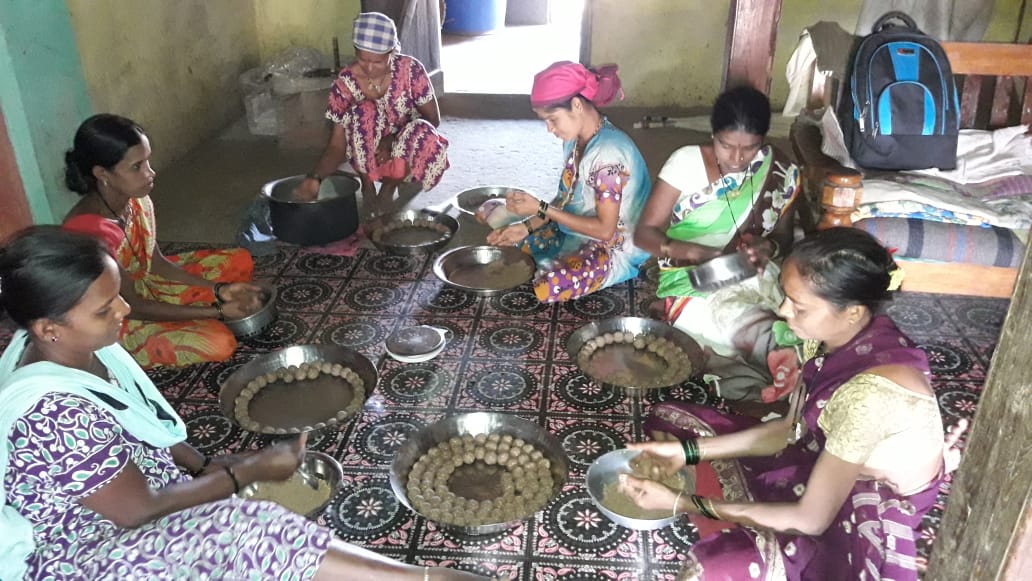 - Relevance and alignment of the projects with the company’s vision, mission, values, and business objectives
- Relevance and alignment of the projects with the company’s vision, mission, values, and business objectives
- Identification and prioritization of the most critical and urgent developmental needs and gaps in the communities where the company operates or has a significant presence
- Feasibility and viability of the projects in terms of resource availability, technical expertise, operational efficiency, and legal compliance
- Potential and expected impact of the projects on the beneficiaries, stakeholders, and the environment in terms of measurable outcomes and indicators
- Sustainability and scalability of the projects in terms of long-term benefits, continuity, and replication
- Involvement and participation of the beneficiaries, stakeholders, and partners in the design, implementation, monitoring, and evaluation of the projects
- Adherence to the ethical standards, transparency, accountability, and governance norms in the execution of the projects
Tata Motors follows a rigorous process of due diligence, appraisal, approval, implementation, monitoring, evaluation, reporting, and documentation for each of its CSR projects. The company also makes sure that its CSR activities are in line with the national and international frameworks Sustainable Development Goals (SDGs), National Voluntary Guidelines on Social, Environmental and Economic Responsibilities of Business (NVGs), United Nations Global Compact (UNGC), etc.
Q. Collaborating with implementation partners is crucial for successful CSR projects. How does Tata Motors identify and select suitable partners, and what qualities do you look for in potential partners?
A. Tata Motors does a thorough Due Diligence and compliance management of its CSR partners and onboards them based on their expertise, alignment with values, proven track record, local knowledge, transparency, and accountability. Community engagement, scalability, innovative solutions, and a focus on sustainability are critical qualities sought in potential partners. Compliance with regulations and a cost-effective approach are also key considerations in partner selection.
Q. Given your extensive experience, what suggestions would you like to share with other corporates and NGOs aiming to enhance the effectiveness of their CSR initiatives? Are there any policy level changes that may help in elevating the impact of corporate social projects?
A. Here are few things that we would like to share with other corporates and NGOs who are aiming to enhance the effectiveness of their CSR initiatives:
- Address the community’s needs and aspirations at every stage of their life.
- Create upstream and downstream linkages, to leverage the strengths and resources of the partners, and ensure sustainability and replicability of the outcomes.
- Create more value with less resources and environmental impact.
- Leverage technology, to improve the efficiency, effectiveness, accessibility, affordability, and innovation of the interventions.
- Measuring social capital, to assess the quality and impact of the relationships, networks and partnerships.
Here are some policy level changes that we think can elevate the impact of CSR projects:
- Encourage collaboration among various stakeholders for CSR design and implementation, to avoid duplication, share knowledge, pool resources, and create synergies.
- Promote innovation and scalability in CSR projects, by providing incentives, support, and enabling environments for new ideas, solutions, and models that can address the societal needs and challenges.
- Strengthen monitoring and evaluation in CSR projects, by establishing clear indicators, standards, and frameworks for measuring and reporting the inputs, outputs, outcomes, and impacts of the interventions.
Q. Looking ahead, what can you share about Tata Motors' roadmap for its CSR initiatives? Are there any new areas of focus or innovative strategies that the company plans to explore?
A. We at Tata Motors believe in fostering inclusive growth and contributing to nation-building through our CSR initiatives. We are committed to advancing our CSR agenda and creating a more inclusive, equitable, and sustainable India. Our commitment to advancing our CSR agenda remains steadfast, as we strive to create a more inclusive, equitable, and sustainable India. By meticulous planning and effectively utilising our financial and human resources, we aspire to make a progressively greater impact with each passing year.





 Q. Tata Motors recently announced their collaboration with Jawahar Novodaya Vidyalayas (JNV) for vocational education. What are the primary objectives of this collaboration and how does it align with the broader CSR vision of your company?
Q. Tata Motors recently announced their collaboration with Jawahar Novodaya Vidyalayas (JNV) for vocational education. What are the primary objectives of this collaboration and how does it align with the broader CSR vision of your company? The courses align with the ‘National Education Policy 2020’ in several ways:
The courses align with the ‘National Education Policy 2020’ in several ways: Q. Could you tell us about some of the key projects in each of the focus areas mentioned above?
Q. Could you tell us about some of the key projects in each of the focus areas mentioned above? - Relevance and alignment of the projects with the company’s vision, mission, values, and business objectives
- Relevance and alignment of the projects with the company’s vision, mission, values, and business objectives
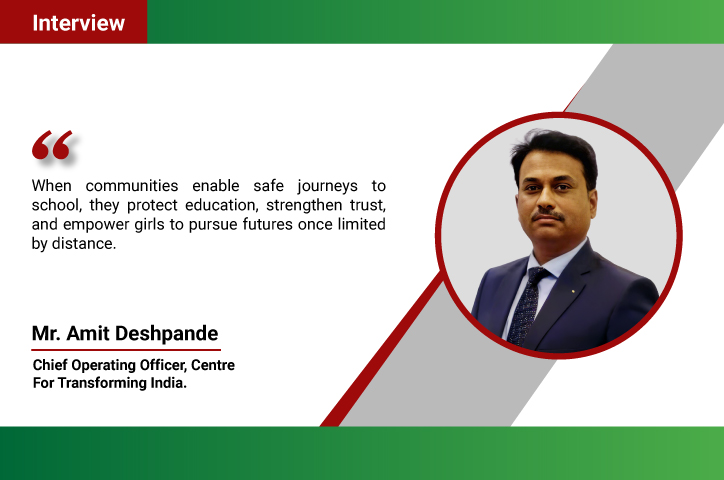








.jpg)



